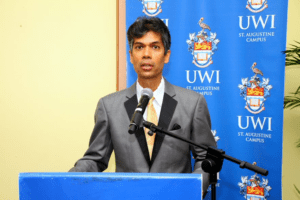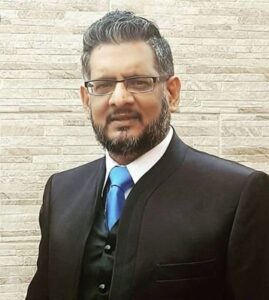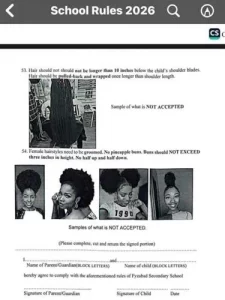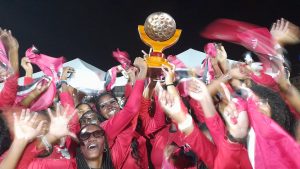‘The effect on the Caribbean of such movies and literature is that the value of life is cheapened and there are escalating levels of homicides’

IT’S unfortunate that every year hundreds of movies and television shows are produced for international audiences to depict violence and horror.
It can be argued that is freedom of speech but we also need to ask- is it a blatant abuse of democracy?
Suspense and horror movies such as- I Spit on Your Grave, Titane, Antichrist, The Painted Bird, Irréversible, Psycho, Wrong Turn, The Exorcist, Pulp Fiction, Kill Bill, Nightmare on Elm Street and Friday the Thirteenth depict grisly murders and tend to glorify violence.
Their popularity is so widespread that the sequels have been extremely profitable. Likewise, movies with vampires have stereotyped men as evil, bloodthirsty and violent. Men have also been negatively portrayed in the novels of the prolific US writer Stephen King.
The effect on the Caribbean of such movies and literature is that the value of life is cheapened and there are escalating levels of homicides. In the last decade among the White working class of the United States there is the feeling that they no longer fit in the social fabric of America. This angry White male is not unique and similar to the lower-class Caribbean males who regularly feel the need to vent anger and frustration for their life in poverty.
Violent acts stem from the depersonalisation which occurs due to prolonged and continuous exposure to violence in the media. This is important in understanding the heinous act of rape and indecent assaults.
During the past few years there is still a relatively high level of sexual crimes in the Caribbean. And, one question that can be raised- could it be directly linked to the amount of violence and pornography being transmitted into our homes?
Undoubtedly, Caribbean people need to deconstruct value systems which portray
violence as an essential attribute of the ideal man. West Indians have used the yardstick of violence to judge the abilities and strength of men. Interestingly, males who are soft-spoken, conservative and unwilling to engage in violence are deemed effeminate or queer by their peers.
In the realm of sports there is also considerable violence which seeks to inculcate in men the association of violence and masculinity. Boxing and wrestling are two sports in the US which have been particularly alluring to Caribbean men. In the Caribbean and Latin America, football (soccer) has been one of the yardsticks of masculinity. Boys aspiring to be sporting icons seek the avenue of cricket or football to earn the admiration of peers and gain the approval of other men and admiration of women. Knowledge and insight of the games is a special domain which promotes bonding among men.
It is a fallacy that this violent nature is a genetic or natural component of men and thus unchangeable. There are caring and responsible men who attempt to resolve disputes and preach peace. The world societies need to reexamine ideologies and institutions which promote stereotypes and distorted images of men. Acts of violence and deviancy reflect the nature and progress of society. Those seeking answers to our dysfunctional families and violent communities do not have to look very far.
Dr Jerome Teelucksingh is an activist. He initiated the inaugural observances of International Day for the Elimination of Violence Against Men and Boys (January 31) and World Day of the Boy Child (May 16). He has made academic presentations at tertiary institutions including Harvard University and Oxford University.
See other articles by Dr Jerome Teelucksingh on AZP News:
Are Humble Caring Fathers Champions?
Influencing West Indian Masculinity
Defining Caribbean Masculinity
Is Monogamy Encouraged in the Caribbean
Naps Girls: From Humble Beginnings to Excellence
US Media Creates Cultural Dependency in the Caribbean
Bloodless Revolution to Save Lives in Developing Countries
The Need for a Social and Moral Revolution
The Law of Supply and Demand in Developing Countries
End the Dependency for Developing Countries
T&T Carnival and the Emperor’s New Clothes
The Influence of Labour on Caribbean Integration
The illusion of political Unity
Presbyterians in Trinidad: Humble Missionaries, Local Workers
Religious Plurality: Curse or Blessing
Caribbean Youth Need Optimism, Patriotism
Rethinking Identities in Caribbean, Latin America
November 19: All Inclusive International Men’s Day
Should International Agencies be Blamed for Unemployment
A Need to Observe Word Unemployment Day
An Ideology for the Trade Union Movement
The Man who Couldn’t be Prime Minister
Social Outburst vs Social Revolution
Challenges of the Men’s Movement
If George Floyd was Denied Parole
The Meaning of Indian Arrival Day in T&T
International Men’s Day – A Way of Life
Wounds that cause school violence
May Day: A Time for Solidarity, Strength
Who Coined the Term ‘Black Power’
The illusion of political Unity
Presbyterians in Trinidad: Humble Missionaries, Local Workers
Religious Plurality: Curse or Blessing
Caribbean Youth Need Optimism, Patriotism
Rethinking Identities in Caribbean, Latin America
November 19: All Inclusive International Men’s Day
Should International Agencies be Blamed for Unemployment
A Need to Observe Word Unemployment Day
An Ideology for the Trade Union Movement
The Man who Couldn’t be Prime Minister
Social Outburst vs Social Revolution
Challenges of the Men’s Movement
If George Floyd was Denied Parole
The Meaning of Indian Arrival Day in T&T
International Men’s Day – A Way of Life
Wounds that cause school violence
May Day: A Time for Solidarity, Strength
Who Coined the Term ‘Black Power’
![]()













